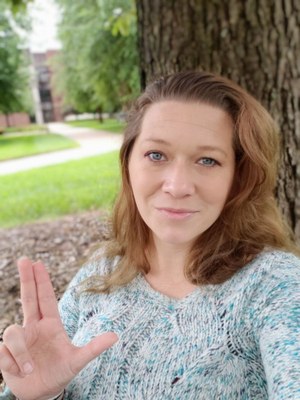SPHIS Home » News » Student Spotlight: Heather Ness Q&A
Student Spotlight: Heather Ness Q&A
 Heather Ness is part of the second cohort of students in the accelerated MPH program. She shares how she became interested in public health, her experience at UofL SPHIS as a non-traditional student, and her post-graduation plans. Heather will earn a BA in Public Health in Spring 2021 and complete an MPH with a concentration in Epidemiology in Spring 2022.
Heather Ness is part of the second cohort of students in the accelerated MPH program. She shares how she became interested in public health, her experience at UofL SPHIS as a non-traditional student, and her post-graduation plans. Heather will earn a BA in Public Health in Spring 2021 and complete an MPH with a concentration in Epidemiology in Spring 2022.
How did you become interested in the field of public health?
Before UofL, I went to the Institute of Technology’s Baking and Pastry Program in California. I used what I learned there to work 10 years in the restaurant business as a professional cook. In 2016, I moved to Kentucky and decided to go back to school and change careers. I always made a point to talk to the health and safety inspectors during their inspections of the restaurants where I worked. Preventing cross-contamination through safe food handling had also been a goal. I later learned that this was a section covered in environmental health.
How did you hear about UofL SPHIS?
I was working at a restaurant at Fort Knox when I started a conversation with the health and safety inspector. It didn’t take long for me to realize I could do that job if I had the training. That lead me to start calling local universities about their programs. The personnel at UofL highly recommended the School of Public Health and Information Sciences after I expressed interest in becoming a safety and health inspector.
Has becoming a health and safety inspector stayed with you through your time at UofL?
My career aspirations have expanded through the years at UofL. My interests now lie within environmental health and infectious diseases instead of limiting myself to becoming an inspector.
What helped guide you through that expansion of interests?
I have been in the UofL’s Honors Program since my sophomore year and most of the Honors seminar classes I took revolved around environmental health and infectious diseases, from marine environment and air pollution to medical mysteries. I also have taken supporting biology classes like Evolutionary Ecology of Disease. During my junior year I was accepted into the Board of Overseers Mentoring Program, which is a yearlong mentorship with a professional in a field of interest to the student. Dr. Leslie Wolf, the director of UofL’s Infectious Diseases Reference Laboratory, came to one of my public health classes as a guest speaker. I knew that I wanted to work with her and asked if she was interested in being a mentor in the Board of Overseers Mentoring Program. I was accepted into the program during the 2019-2020 academic year with Dr. Wolf serving as my mentor.
How did your relationship with your mentor help develop your interests?
My experience took me into the Infectious Diseases Laboratory where I learned how to complete various tests and assays that quantified whether a person was infected with a specific pathogen. In addition to the practical hands-on experience of working in a lab, Dr. Wolf also guided me through a study’s components and how to act professionally with an eye to leadership. Our working relationship fused very well together and our letters to the coordinator at the end of the program must have exhibited that relationship well because I was chosen as one of the 2020 Board of Overseers Mentoring Program scholarship awardees.
What other programs have you participated in at UofL?
I recently finished the Summer Research Opportunities Project (SROP) 2020 through the Office of the Executive Vice President for Research and Innovation and the Office of the Provost. I am grateful to Dr. Wolf again for being my mentor through this program. The SROP included a 10-week intensive research collaboration with Dr. Wolf and concluded with a poster presentation outlining the research project.
How did COVID-19 affect your research?
COVID-19 became a pandemic during the last month of the Board of Overseer Mentoring Program and social distancing guidelines were in full force by the time SROP began. Usually UofL has many student research programs running through the summer, but SROP was the only one to continue this year. We had an abrupt move to remote research that affected most students’ research projects. I was the only one who completed in-person research because the Infectious Diseases Laboratory was still fully operational. My research looked at the detection of SARS-CoV-2 (the virus that causes the disease COVID-19) in breast milk of COVID-19 positive patients.
SROP participants presented posters on July 31 on Belknap Campus. We all were strictly spaced out in the BAB building, had limited visitors, and followed social distancing and mask requirements. The coordinators did an excellent job to create a safe environment in which to present in-person.
Explain your experience as part of the first cohort of students in the Accelerated MPH program.
I am one of the students that was accepted into the 4+1 Accelerated MPH program. My concentration focus is Epidemiology, which is in high demand with the pandemic in full swing. The accelerated program allows undergraduate public health students the opportunity to take master’s level classes along with finishing their undergraduate courses. Being part of the first cohort of students is an exciting experience. Being a non-traditional student who also has three children to care for really emphasized my need to complete my schooling in a timely manner. Most of the jobs want someone with a master’s degree under their belt. I decided to apply for the 4+1 so that I could reach the goal of getting into a career that would support my children faster.
What are your hopes and plans for the upcoming academic year? Will you be graduating soon? Do you know what type of career path you would like to pursue upon graduation?
I plan on finding more research opportunities in the next year. Epidemiology is centered around research, and I want as much exposure as I can to the field before I graduate. I hope that I will adapt well to the hybrid and online format that our classes have moved to. My only consolation this semester is that we are all in the same boat trying to navigate through the pandemic together. Not just at the city or state level, but at a world level.
My aspiration for after graduation is to work for a government agency, such as the CDC, to improve population health. I am unsure if I will focus on environmental health or infectious diseases. Both paths have a wide variety within their fields and choosing one solid thing to go after right now makes me think I am limiting my potential rather than strengthening it. I still have a few years before I have to decide, and I think it’s important for students to know that it’s okay to not know where your path will lead you.






